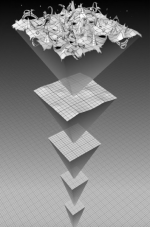SLD
Contributor
Reading some Quantum Physics and enjoying it. One of the many ideas presented concerns the structure of space time at extremely microscopic levels. I.e. the quantum foam we’ve all heard about.

However no one seems to address how a photon navigates through this structure. Wouldn’t it slow it down? Alter its frequency? Affect it somehow? Or at least reveal its structure? Or is a photon really just way too big to be affected by it? I always thought the photon was pretty much a point particle.
SLD

However no one seems to address how a photon navigates through this structure. Wouldn’t it slow it down? Alter its frequency? Affect it somehow? Or at least reveal its structure? Or is a photon really just way too big to be affected by it? I always thought the photon was pretty much a point particle.
SLD
